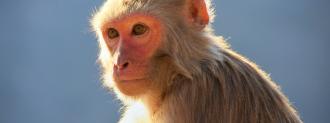A new COVID-19 vaccine successfully protected rhesus macaques (a type of monkey) from infection by the novel coronavirus, according to the Chinese company Sinovac Biotech.
This marks the first report of any potential coronavirus vaccine actually preventing an infection in any animal.
Sinovac’s study of its vaccine has yet to be peer-reviewed — and some scientists are already pointing out its shortcomings — but if the results can be replicated, they’d mark a major step forward along the path to a COVID-19 vaccine.
Sinovac’s COVID-19 Vaccine
On April 19, the Sinovac team published a paper detailing its COVID-19 vaccine study on the preprint server bioRxiv.
This is the first report of any potential coronavirus vaccine preventing an infection in an animal.
The researchers say they gave four rhesus macaques a high dose of Sinovac’s vaccine and four a low dose. Three weeks later, they introduced the coronavirus directly into the animals’ lungs via a tube in their tracheas.
Seven days after that, the researchers could not detect any coronavirus in the pharynx or lungs of any of the monkeys that received the higher dose of the COVID-19 vaccine.
Those that received the lower dose, meanwhile, did experience what the researchers described as a “viral blip,” but none of the animals developed a full-blown coronavirus infection or experienced any obvious side effects, either.
The four macaques that didn’t receive the vaccine, however, developed severe pneumonia and showed high levels of viral RNA in several parts of their bodies when exposed to the coronavirus.
An Old-School Approach
Sinovac’s COVID-19 vaccine uses a chemically inactivated version of the coronavirus to prompt immunity — a tried-and-true approach to vaccination.
“I like it. This is old school but it might work,” virologist Florian Krammer, who wasn’t involved in the study, told Science Mag. “What I like most is that many vaccine producers, also in lower-middle-income countries, could make such a vaccine.”
University of Pittsburgh immunologist Douglas Reed, however, told Science that Sinovac’s study was too small to tell us very much about how well the vaccine works, and he questioned whether the coronavirus grown to infect the monkeys was similar enough to the strains causing the pandemic right now.
Lucy Walker, a professor of immune regulation at University College London, meanwhile, noted on Twitter that the study did not answer the key question: whether or not the COVID-19 vaccine could provide long-term immunity, as opposed to just a few weeks of protection.
Additionally, macaques don’t appear to respond as severely to the coronavirus as humans — and as with any scientific research, the results of animal studies are never guaranteed to hold true in people.
The Leap to Humans
Still, Meng Weining, Sinovac’s senior director for overseas regulatory affairs, told Science that the results of the macaque study have given the team “a lot of confidence” that their COVID-19 vaccine will work in humans.
They won’t have to wait long to find out if they’re right, either, as a Phase I human trial began on April 16.
That trial enrolled 144 individuals to get varying doses of the vaccine to determine whether or not it’s safe for humans.
If it is, the next step would be a Phase II trial involving more than 1,000 people to test the vaccine’s efficacy. That trial could start as soon as mid-May, with results by the end of June.






